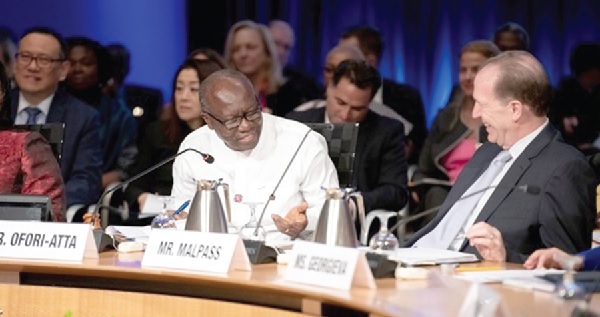
IMF deal: Govt seeks support to fight corruption, ensure transparency
The government has requested technical assistance from the International Monetary Fund (IMF) to enable it to help promote, governance, transparency and fight corruption as the $3 billion bailout programme kicks in.
In what is expected to assuage the fears of sections of the public as to whether the government will be able to jealously protect the funds from the Breton Wood institution, the programme is expected to help the government to conduct what has been described as a Governance Corruption Diagnostic Assessment which will be used as input into the ongoing efforts to update the National anticorruption Action Plan.
According to a brief published by the IMF, it said the programme will also help to address weaknesses in the existing asset declaration system for public officials, by enacting a new Conduct of Public Officers Act.
Consequently, the Ghana Revenue Authority (GRA), with support from IMF technical assistance, is developing a plan with the aim to improve the professional standards of tax administration in Ghana.
Monitorting/evaluation
In a sharp reaction to the intended programme, an economist, Professor Peter Quartey said the move taken by the government and the IMF must be fully backed with actions that will ensure its full success.
He told the Graphic Business in an interview that there must be constant monitoring and evaluation of the processes to ensure that the various targets set are fully achieved.
The Director of the Institute of Statistical, Social and Economic Research (ISSER) said the move was a welcome step which will keep the agitating public calm while they watch the government implement what is due it to continue winning the confidence of the people to do what is required to return the economy to its former glory.
Board approvals
The IMF Executive Board approved, on May 17th, about US$3 billion 36-month Extended Credit Facility (ECF) arrangement for Ghana.
This decision enabled an immediate disbursement equivalent to about US$604 million with the rest expected to be disbursed in tranches every six months, following programme reviews approved by the IMF Executive Board.
Having had the economy battered by a combination of weaknesses in economic management and policy implementation coupled with external shocks such as the COVID-19 and the Russia/Ukraine war, the IMF deal is expected to help restore macroeconomic stability, ensure debt sustainability, and lay the foundations for higher and more inclusive growth.
Policy priorities
A number of policy priorities have been laid out by the government, first of which will see a large and frontloaded measures to bring public finances back on a sustainable path.
This will be done through the mobilization of more domestic revenue and improving the efficiency of public spending.
The 2023 budget has for example doubled the benefits of the existing targeted cash transfer program, the Living Empowerment Against Poverty (LEAP) and boosted the allocations towards the school feeding program.
The second is to support the fiscal adjustment and enhance resilience to shocks, ambitious structural reforms will be implemented in the areas of tax policy, revenue administration, public financial management, as well as to address weaknesses in the energy and cocoa sectors; while the third will see steps taken to bring inflation under control.
The fourth will witness measures to preserve financial stability which is considered very central to the programme while, finally, the reforms are envisaged to encourage private investment, growth, and job creation.
Bilateral debt
Meanwhile, regarding official bilateral debt, the next step is for the Official Creditor Committee for Ghana, under the G20 Common Framework, to agree with the authorities the specific modalities of how official creditors intend to deliver debt relief consistent with Fund-programme parameters.
Government is already feverishly engaging with its private creditors to seek relief on the country’s external debt.